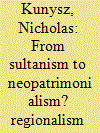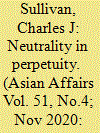| Srl | Item |
| 1 |
ID:
110787


|
|
|
|
|
| Publication |
2012.
|
| Summary/Abstract |
This paper proposes that under President Berdimuhamedov, the government of Turkmenistan has begun to move away from the 'sultanism' of the Niyazov era. Instead, the new government exhibits characteristics and has pursued policy changes that prepare conditions for the further development and entrenchment of localized networks of elites based on kinship. Such changes suggest that the government of Turkmenistan may develop into a more classic neopatrimonial system of authoritarian governance similar to the other post-Soviet republics in Central Asia. This argument is advanced by examining changes between the governments of former President Niyazov and Berdimuhamedov with regard to three areas of the Turkmen state's relationship with its constituent regions: regional composition of the national cabinet; hakim (governor) policy; and regional development. This examination relies largely on a comprehensive survey of online Turkmen state-media sources, as well as numerous supportive secondary sources.
|
|
|
|
|
|
|
|
|
|
|
|
|
|
|
|
| 2 |
ID:
182830


|
|
|
|
|
| Summary/Abstract |
Since the passing of Turkmenistan's first president, Saparmurat Niyazov, in late 2006, Gurbanguly Berdymukhamedov has ruled over Turkmenistan. Although authoritarian regimes occasionally undergo reform following a transition from one leader to the next, the dictatorship in Ashgabat remains intact and Berdymukhamedov has not modified his predecessor's foreign policy doctrine. Why though has Turkmenistan chosen not to revise its “permanent neutrality” status under new leadership? This article stipulates that the ruling elites in Ashgabat have preserved Turkmenistan's neutrality for three reasons. First, in contrast to other isolated dictatorships, the government of Turkmenistan does not have to contend against any state adversaries or antagonize a foreign power to legitimate its rule. Instead, Turkmenistan portrays itself in the United Nations General Assembly as an exemplary neutral state and this affords the regime latitude in navigating geopolitics. Second, while Berdymukhamedov has revised aspects of the Niyazov dictatorship, the Arkadag personality cult heralds him as the “protector” of Turkmenistan's sovereignty. “Permanent neutrality” thus undergirds the president's political legitimacy to some degree. Third, Turkmenistan's neutrality contributes to the ruling elites' maintenance of a corrupt and repressive regime through which they exert control over the economy. Hence, in spite of many challenges facing the country, the ruling regime will likely endure.
|
|
|
|
|
|
|
|
|
|
|
|
|
|
|
|